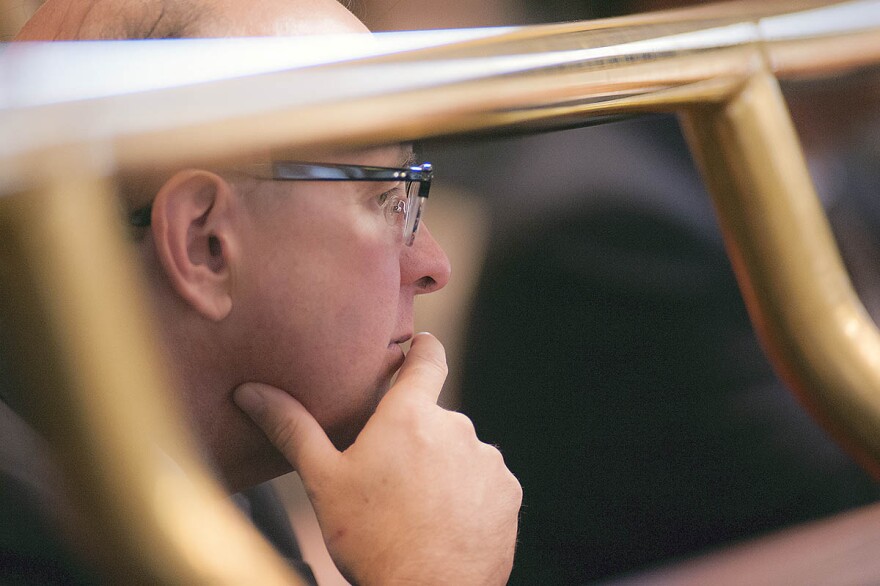A federal judge has ruled that President Donald Trump’s election fraud commission must share correspondence and other documents with one of its Democratic members, Maine Secretary of State Matt Dunlap.
Dunlap sued the panel in November after asserting that its conservative members had stopped providing him information about its work.
The ruling is a big victory for Dunlap, who was criticized by fellow Democrats and voting rights advocates for agreeing to join a commission that some worry will be used to nationalize voter suppression efforts.
Dunlap says he has no idea what his conservative colleagues on the president’s election fraud panel have been up to for the past several months. And he says he’s not sure what documents may come his way now that a U.S. District Court judge in Washington, D.C., has ordered the commission to provide full access to its working papers.
But Dunlap says he does know this: that his national profile has risen sharply as he has aggressively dogged the commission over the past several months.
“It’s bizarre, truly surreal. You know, I’m not leaping into the breach at the Battle of Gettysburg here. I mean, I’m literally asking for basic documents,” he says.
When Dunlap first announced that he was one of a handful of Democrats named to Trump’s election commission, he was quickly criticized for allowing the administration to use him as a bipartisan veneer to what many considered an overtly partisan endeavor.
“It seemed to me that this was a commission that was not aimed at doing something fair, but was aimed at trying to substantiate the president’s unsubstantiated claims that there was massive voter fraud in the last election, and use that as an excuse to perhaps propose federal or state legislation to make it harder to register and vote,” says Rick Hasen, a political science professor at the University of California-Irvine who specializes in election law.
Hasen says Trump’s fraud panel is stacked with voter fraud evangelists such as Kansas Secretary of State Kris Kobach and Hans von Spakovsky of the Heritage Foundation. In May, Hasen wrote a column for the Portland Press Herald warning Dunlap that he was being set up as a patsy.
“Dunlap’s participation just gives someone like Kris Kobach a cover to be able to claim that this is a bipartisan effort, when in fact it’s lopsided and seems aimed at some preconceived conclusions about where things are going to go,” he says.
And Hasen says he worries that the real agenda was to craft voting policies that could disenfranchise those who are not behind the conservative cause. He and others urged Dunlap not to legitimize the commission and boycott it altogether.
But Dunlap says he believes that by serving on the panel, he has a platform to call out irregularities in its work. That effort began with a public takedown of Kobach, the commission’s co-chairman, at a meeting in New Hampshire in September, when Dunlap challenged Kobach’s claim that the 5,000 people who registered to vote last year with out-of-state IDs and failed to later get in-state IDs, as required by N.H. state law, was evidence of voter fraud.
“Making this equation that somehow people not updating their driver’s license is an indicator of voter fraud would be almost as absurd as saying that if you have cash in your wallet, that that’s proof that you robbed a bank. I think it’s a reckless statement to make,” Dunlap said.
Dunlap made the case that most of the people who used out-of-state IDs to register were attending college in New Hampshire and legally allowed to vote there. He says Kobach didn’t refute that argument, but that the commission “went dark” after the meeting.
“It was after that that I kind of got cut off,” he says.
Dunlap says he couldn’t get information from staff, and he heard rumors of plans to issue a report as early as March — a report potentially excluding input from Dunlap and his Democratic colleagues.
“What reference documents are they using? What data are they gathering? What drafting has been going on toward the final product for report that the rest of us have not seen?” he says.
In the fall, Dunlap decided to sue the commission. He enlisted the legal help of American Oversight, a D.C. group co-founded by Austin Evers, former counsel to the State Department during the Obama administration.
And that’s when members of the commission began attacking Dunlap. Among them was J. Christian Adams, a conservative activist and attorney.
“It’s unfortunate, you know, the president wants to get something done, and all of these ‘resist’ people, which apparently now includes the Maine secretary of state, are trying to stop it,” he said on “Fox and Friends” last month.
Dunlap shrugs off the attacks, claiming that he has become a Trojan horse for the progressive resistance. He says he just wants to make sure the commission does its work transparently, and that whatever report it produces is shared and vetted.
Hasen says the odds of that happening are better now that a federal judge has ruled in Dunlap’s favor.
“I would much rather have people not participate in this sham commission than participate. But if someone is going to participate, they should be playing the watchdog role that Secretary Dunlap has been playing,” he says.
Dunlap says he isn’t sure whether the Trump administration picked him thinking it could use his party affiliation to guild a partisan voter fraud report. But at this point, he says it would take a lot to convince him otherwise.



